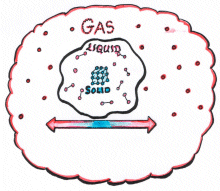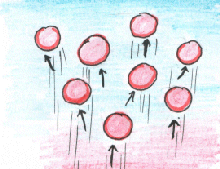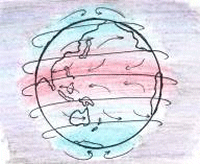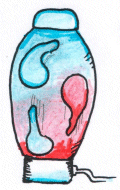| Air
is good at transferring thermal energy by CONVECTION
Definition: Thermal
CONVECTION is the transfer of thermal energy by the actual movement of
heated material. |
|||||
|
Solids,
liquids and gases are made of tiny pieces of matter called molecules. In
gases these tiny pieces of matter are spaced far apart. This means we cannot
see them directly though we can
be aware of their presence in the effects of their movement in the wind.
The challenge in teaching about Earth's climate is to make its invisible
world of gases visible. The
molecules in a gas are far apart because the bonds holding them together
are
weak. This means molecules can be moved with ease i.e. a small energy
input results in large movement. When
gases are heated and expand they move upwards.
Thermal
CONVECTION is the name given to the transfer of thermal energy by the actual movement of
heated molecules. It only occurs in liquids and gases.( By comparison,
thermal CONDUCTION is the transfer that occurs when a warmed molecule
touches a cooler molecule.)
The
ability of air molecules to move relatively freely gives the
atmosphere its wonderful ability to transfer thermal energy around the
planet and moderate its temperature extremes. We experience this thermal transfer as wind and rain. Note:
Thermal
energy always moves from regions retaining higher amounts of thermal
energy to regions with less. Transfer is one way. A
build-up of thermal energy in the atmosphere may lead to increased risk
of weather ‘events’ such as droughts, floods and cyclones in some
regions. Note.
Lava lamps provide a graphic illustration of convection. They are an
excellent reminder to students of all ages of the process that drives
the movement the plates of the earth, the currents of the oceans and the
winds of the atmosphere. This page is part of a programme Communicating and Teaching the scientific principles underlying Climate Change issues. |
|
||||
|
Web Animation Convection |
|||||
|
Web lesson |
|||||
|
Web detail Global Air Movement |
|||||




